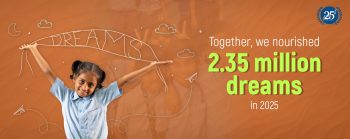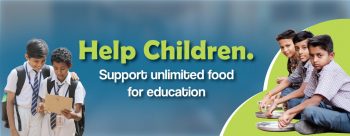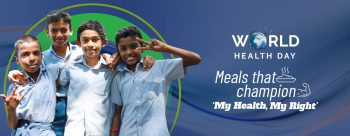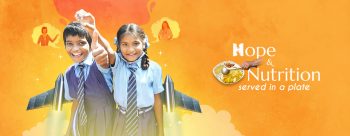2022 was a landmark year for us at The Akshaya Patra Foundation!
Our NGO hit the milestone of nourishing over 2 million (20,10,516) children in 22,367 schools daily under PM Poshan Abhiyaan (earlier called the Mid-Day Meal Scheme or MDM) and also launched new initiatives to level up the nutrition our beneficiaries receive.
We explored deeper into sustainability and established new kitchens across India to serve more people in need. We also received four awards including the India Today Happiness Award, the Business World Social Impact Award, the Mahatma Award for Social Good and Impact ‘Zero Hunger’, and the CSR Times Award – Gold Category in the field of ‘Eradication of Extreme Hunger and Malnutrition’.
Let’s have a look at what we accomplished together in 2022 as we pull up our sleeves to tackle 2023.
Inaugurated 9 new kitchens
We inaugurated eight centralised kitchens and one decentralised facility in 2022:
Centralised kitchens:
• Puducherry kitchen: feeds over 49,796 children in 537 schools
• Varanasi kitchen, Gujarat: feeds over 100,000 children in 282 schools
• Anantapur kitchen, Andhra Pradesh: feeds over 1,756 children in 13 schools
• Mangalagiri kitchen, Andhra Pradesh: feeds over 20,432 children in 309 schools
• Dehradun kitchen, Uttarakhand: feeds over 11,900 children in 132 schools
• Mansa kitchen, Gujarat: feeds over 26,000 children in 190 schools
• Jorhat kitchen, Assam: feeds over 10,070 children in 156 schools
• Gadarpur kitchen, Uttarakhand: New Kitchen, feeding yet to be started.
Decentralised kitchen
• Chikkaballapur kitchen, Karnataka: serves 1,000 meals a day in 8 schools
Donations from generous donors such as the Hans Foundation and IndusInd Bank made these kitchens possible. Many dignitaries, including the Indian Prime Minister Sri Narendra Modi and the Home Minister Sri Amit Shah, attended the inauguration and pledged their support for our efforts.
Launched Digital Education Programme in partnership with an EdTech company
Since the digital revolution, many people could access learning easily on their digital devices. However, children from low-income backgrounds were distanced from several opportunities for growth and better quality of education as they could not afford such devices.
Thus, we launched our digital education programme in partnership with an EdTech company to bridge the gap between quality education and digital access. It engages in Government and Government-aided schools to improve the quality of education while supporting the Government’s vision of ‘Digital India’.
This free education programme provides digital aids to children from economically weaker sections to boost learning outcomes while making education an enjoyable experience. The new initiative also allows children to prepare for competitive exams.
It also supports teachers with tech-enabled teaching tools to make teaching an exciting experience and impart better learning to students. Furthermore, it also supplements our efforts in implementing the PM Poshan Abhiyaan (earlier called the MDM Programme) by promoting quality education in the beneficiary schools.
Introduced millets in school meals
When compared to rice and wheat, millets are cereal food crops with a nutrition value that is five times higher. They are abundant in iron, zinc, calcium, complex carbohydrates, dietary fibre and other minerals vital for reducing malnutrition in India.
They are also easily digestible and boost the neurological system. They include higher amounts of niacin, vitamin B6, folic acid, potassium, phosphorus and magnesium, thus enabling us to add more micronutrients to the food we serve to children.
Therefore, we hope to benefit millions of children in India by including millet in school meals. It will improve digestion, lower cholesterol, prevent heart disease, prevent diabetes, reduce the risk of developing cancer, increase energy levels and improve the muscular system.
Finally, these crops are also a crucial component of sustainable food-growing methods because they are indigenous to India and can be cultivated in low-fertility soils with little input of fertilisers and pesticides.
As a result, our NGO signed a Memorandum of Understanding (MoU) with Nutrihub, the Indian Institute of Millets Research (IIMR), and the Indian Council for Agricultural Research (ICAR) to include millets in the menu for children’s mid-day meals.
Incorporated sustainable kitchen infrastructure
Our kitchens adhere to cutting-edge manufacturing techniques for preparing school meals, maintaining global standards of quality and ensuring that our beneficiaries get the healthiest meals possible.
With our new kitchens, we are taking a step ahead in combining sustainability with technology. For instance, during food production in our new kitchens, we now employ solar panels to generate power along with a heat pump and solar water heater.
Started the Breakfast Feeding Programme
Breakfast ensures that children have enough nourishment and energy to attend lessons every day with better focus and interest, according to a review of studies on the subject. They attend classes regularly, practise excellent behaviour and exhibit enhanced academic success. Additionally, it reduces expenses for lower-income households, encouraging them to enrol their children in school. But those children who miss breakfast make more mistakes and have worse memory recall.
Therefore, well-planned and nutrient-rich food would aid children in recovering from widespread undernourishment and the Indian population in the long run. In light of this, our NGO began supplying breakfast in addition to lunch in Government schools, beginning with those in Tamil Nadu, Telangana and Karnataka.
Build a sustainable future for India with tax-exempted donations
With the help of our generous donor family, we were also able to distribute 240 million meals as food relief during the Bangalore, Assam and Godavari floods. Now, new kitchens and initiatives based on sound research are underway.
To increase their impact, we need your unwavering support.
One can now support a child’s breakfast, lunch and education for a year with ₹2500 and help put an end to child malnutrition in India. When you donate to our NGO, you can also avail 50% tax exemption under Section 80G of the Income Tax Act as we are registered u/s 12A of the Act as a non-profit organisation.
All online donations over ₹500 to Akshaya Patra are eligible for 50% tax exemption and donors will receive a tax exemption certificate as proof to claim 80G deductions.
So, let’s not wait to bring health, education and opportunities to millions of underprivileged children.
Make a tax-exempted donation online with a few clicks and help shape India’s hunger-free future!







